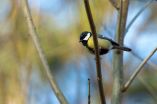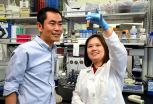(Press-News.org) The New England Journal of Medicine reports positive results of a phase 1 clinical trial of the drug crizotinib against the subset of lung cancer marked by rearrangement of the gene ROS1. In this multi-center study of 50 patients with advanced non-small cell lung cancer testing positive for ROS1 gene rearrangement, the response rate was 72 percent, with 3 complete responses and 33 partial responses. Median progression-free survival – the time it takes for the disease to resume its growth after being slowed by treatment – is estimated at 19.2 months with exactly half of patients remaining on observation for disease progression that has not yet occurred.
Over 200,000 people in the United States are diagnosed with lung cancer annually and advanced stage lung cancer has a 5-year survival rate of only about 2 percent. ROS1 rearrangements are found in approximately 1 percent of lung cancer patients, the majority of whom have never smoked.
"This is a major advance for the clinical treatment of lung cancer," says Robert C. Doebele, MD, PhD, investigator at the University of Colorado Cancer Center, associate professor of Medical Oncology at the CU School of Medicine, and one of the study authors. Doebele was involved primarily in the characterization of ROS1 gene rearrangements. Additional CU Cancer Center researchers involved in the project include Marileila Varella-Garcia, PhD, who developed a test for the ROS1 rearrangement in patient tumor samples, and Ross Camidge, MD, PhD, who was involved in the clinical testing of crizotinib against both ALK-positive and now ROS1-positive lung cancers.
In fact, current results follow similar activity seen earlier for the drug against lung cancers marked by rearrangement of the gene ALK. Crizotinib earned FDA approval for treatment of ALK-positive lung cancer in 2011. Both ALK and ROS1 are proteins in the family of tyrosine kinases that normally control the behavior of cells; in the case of these rearrangements, the altered genes continuously signal cells to improperly grow, spread and survive, making the cells act cancerous.
As in the case of ALK-positive lung cancer, in which the gene ALK improperly fuses with the nearby gene EML4, in this newly studied subtype of lung cancer, the gene ROS1 fuses with a nearby partner. Tumor samples studied in the current study showed 5 known gene partners for ROS1 fusion and 2 new partners. The most commonly rearrangement was of ROS1 with the gene CD74, but no matter the ROS1 partner, all rearrangements were equally susceptible to treatment with crizotinib.
"This is ongoing work in which the primary goal of this phase one study was to characterize the safety of the drug. Not only was the safety profile promising, but we saw anti-cancer activity that makes us extremely optimistic for future trials," Doebele says.
In fact, and though it will need to be confirmed by future trials, crizotinib may have an even more durable action against ROS1-positive lung cancer than it does against ALK-positive lung cancer, the disease for which the drug was initially developed and approved. Specifically, median progression free survival for crizotinib against ROS1-positive lung cancer is just more than double the progression free survival for the drug against ALK-positive lung cancer.
INFORMATION:
NEJM: Crizotinib effective in Phase 1 trial against ROS1 lung cancer
72 percent response rate with 19.2 months progression-free survival
2014-09-30
ELSE PRESS RELEASES FROM THIS DATE:
Pollution linked to lethal sea turtle tumors
2014-09-30
DURHAM, N.C. -- Pollution in urban and farm runoff in Hawaii is causing tumors in endangered sea turtles, a new study finds.
The study, published Tuesday in the peer-reviewed open-access journal PeerJ, shows that nitrogen in the runoff ends up in algae that the turtles eat, promoting the formation of tumors on the animals' eyes, flippers and internal organs.
Scientists at Duke University, the University of Hawaii and the National Oceanic and Atmospheric Administration (NOAA) conducted the study to better understand the causes behind the tumor-forming disease Fibropapillomatosis, ...
Adolescent exposure to thc may cause immune systems to go up in smoke
2014-09-30
When it comes to using marijuana, new research, involving mice and published in the October 2014 issue of the Journal of Leukocyte Biology, suggests that just because you can do it, doesn't mean that you should. That's because a team of Italian scientists have found that using marijuana in adolescence may do serious long-term damage to the immune system. This damage may result in autoimmune diseases and chronic inflammatory diseases, such as multiple sclerosis, inflammatory bowel disease and rheumatoid arthritis in adulthood.
"I hope that the knowledge that early exposure ...
Cancer therapy: Driving cancer cells to suicide
2014-09-30
Researchers of Ludwig-Maximilians-Universitaet (LMU) in Munich report that a new class of chemical compounds makes cancer cells more sensitive to chemotherapeutic drugs. They have also pinpointed the relevant target enzyme, thus identifying a new target for anti-tumor agents.
Researchers led by LMU's Professor Angelika Vollmar and Professor Stephan Sieber of the Technische Universität München have identified a class of chemicals that represent a potential new weapon in the fight against malignant tumors. The compound is itself non-toxic, but it stimulates the killing ...
Scientists identify which genes are active in muscles of men and women
2014-09-30
If you want your doctor to know what goes wrong with your muscles because of age, disease or injury, it's a good idea to know what "normal" actually is. That's where a new research report published in the October 2014 issue of the FASEB Journal comes in. In the report, a team of scientists produce a complete transcriptome—a key set of molecules that can help scientists "see" which genes are active in an organ at a particular time. What's more, they found never-before-detected gene activity and that men have approximately 400 more active genes in their skeletal muscle than ...
Synthetic sperm protein raises the chance for successful in vitro fertilization
2014-09-30
Having trouble getting pregnant—even with IVF? Here's some hope: A new research report published in October 2014 issue of The FASEB Journal, explains how scientists developed a synthetic version of a sperm-originated protein known as PAWP, which induced embryo development in human and mouse eggs similar to the natural triggering of embryo development by the sperm cell during fertilization.
"We believe that the results of this study represent a major paradigm shift in our understanding of human fertilization by providing a precise answer to a fundamental unresolved scientific ...
Genetic test for cancer patients could be cost-effective and prevent further cases
2014-09-30
Screening for a genetic condition in younger people who are diagnosed with bowel cancer would be cost-effective for the NHS and prevent new cases in them and their relatives, new research has concluded.
Researchers at the University of Exeter Medical School were funded by the National Institute for Health Research Health Technology Assessment (NIHR HTA) Programme to assess the effectiveness and cost-effectiveness of screening for Lynch Syndrome. Their findings, published in Health Technology Assessment, indicate that screening the 1,700 people under the age of 50 who ...
Risky metabolism
2014-09-30
This news release is available in German.
Animals often differ in their behavioural response to risky situations such as exposure to predators. Researchers from the Max Planck Institute for Ornithology now found in a long-term study on different populations of great tits that risk-taking behaviour correlates with both metabolic rate and ambient temperature. High metabolic rates and low temperatures were associated with high risk-taking behaviour, as in these scenarios birds were more likely to approach potential predators.
The readiness to take a risk is to a ...
New blood test determines whether you have or are likely to get cancer
2014-09-30
A new research report published in the October 2014 issue of The FASEB Journal may make the early detection of cancer as easy as a simple blood test. This test, called the "lymphocyte genome sensitivity" (LGS) test, could not only detect some cancers earlier than ever before, but it may eliminate the need for some types of biopsies, as well as identify those more likely to develop cancer in the future.
"The test could allow earlier cancer detection, so helping to save peoples' lives," said Diana Anderson, a researcher involved in the work from the School of Life Sciences ...
Tropical Storm Rachel dwarfed by developing system 90E
2014-09-30
Tropical Storm Rachel is spinning down west of Mexico's Baja California, and another tropical low pressure area developing off the coast of southwestern Mexico dwarfs the tropical storm. NOAA's GOES-West satellite showed the size difference between the two tropical low pressure areas.
NOAA's GOES-West satellite captured an image of the Eastern Pacific Ocean on Sept. 30 at 1200 UTC (8 a.m. EDT). In the infrared image, Tropical Storm Rachel appeared small in comparison to the low pressure area called System 90E, coming together hundreds of miles south. As Rachel spins down ...
Virginia Tech researchers discover potential biomarker to detect 'bubble boy' disorder
2014-09-30
Many people recognize "the bubble boy" as an unusual character from a "Seinfeld" episode or a John Travolta movie.
But in reality, a genetic disease called SCID, short for severe combined immunodeficiency, forces patients to breathe filtered air and avoid human contact because their bodies' natural defenses are too weak to fight germs.
Although it affects fewer than 2,000 new births each year worldwide, SCID is a cousin to acquired immune deficiency syndrome triggered by a human immunodeficiency virus — HIV/AIDS.
Now, using a mouse model, Virginia Tech researchers ...
LAST 30 PRESS RELEASES:
New knowledge on heritability paves the way for better treatment of people with chronic inflammatory bowel disease
Under the Lens: Microbiologists Nicola Holden and Gil Domingue weigh in on the raw milk debate
Science reveals why you can’t resist a snack – even when you’re full
Kidney cancer study finds belzutifan plus pembrolizumab post-surgery helps patients at high risk for relapse stay cancer-free longer
Alkali cation effects in electrochemical carbon dioxide reduction
Test platforms for charging wireless cars now fit on a bench
$3 million NIH grant funds national study of Medicare Advantage’s benefit expansion into social supports
Amplified Sciences achieves CAP accreditation for cutting-edge diagnostic lab
Fred Hutch announces 12 recipients of the annual Harold M. Weintraub Graduate Student Award
Native forest litter helps rebuild soil life in post-mining landscapes
Mountain soils in arid regions may emit more greenhouse gas as climate shifts, new study finds
Pairing biochar with other soil amendments could unlock stronger gains in soil health
Why do we get a skip in our step when we’re happy? Thank dopamine
UC Irvine scientists uncover cellular mechanism behind muscle repair
Platform to map living brain noninvasively takes next big step
Stress-testing the Cascadia Subduction Zone reveals variability that could impact how earthquakes spread
We may be underestimating the true carbon cost of northern wildfires
Blood test predicts which bladder cancer patients may safely skip surgery
Kennesaw State's Vijay Anand honored as National Academy of Inventors Senior Member
Recovery from whaling reveals the role of age in Humpback reproduction
Can the canny tick help prevent disease like MS and cancer?
Newcomer children show lower rates of emergency department use for non‑urgent conditions, study finds
Cognitive and neuropsychiatric function in former American football players
From trash to climate tech: rubber gloves find new life as carbon capturers materials
A step towards needed treatments for hantaviruses in new molecular map
Boys are more motivated, while girls are more compassionate?
Study identifies opposing roles for IL6 and IL6R in long-term mortality
AI accurately spots medical disorder from privacy-conscious hand images
Transient Pauli blocking for broadband ultrafast optical switching
Political polarization can spur CO2 emissions, stymie climate action
[Press-News.org] NEJM: Crizotinib effective in Phase 1 trial against ROS1 lung cancer72 percent response rate with 19.2 months progression-free survival



